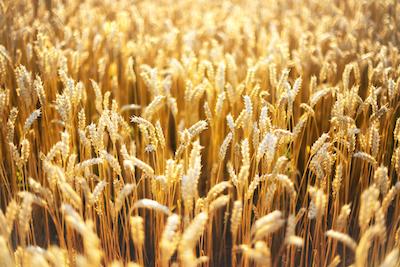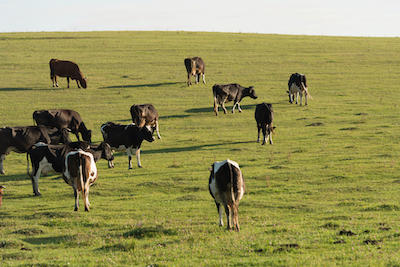Ukraine’s accession into the European Union could offer the bloc’s farming sector an environmental lifeline – and green policy experts are hoping Brussels will latch on.
For years, the EU has been at pains to make its agricultural sector more environmentally friendly. Most attempts to rewire its age-old and productivity-oriented main farming law, the common agricultural policy (Cap), are almost invariably thwarted, a result due in no small part to pressure from Brussels’ extremely well-networked farm and agrochemicals lobbies.
In the latest round of reforms to the Cap in 2021, EU governments rejected attempts to link its rules to the targets of the EU Green Deal, the outgoing Commission’s flagship strategy to achieve climate neutrality by 2050 by giving its most intensive industries, including food and farming, a green makeover.
And the EU Green Deal has had its fair share of defeats too. Just last November, two crucial proposals addressing the environmental impacts of EU farming were pretty much scuttled. (The first bill, which aimed to reduce the use of the riskiest agricultural pesticides, was rejected in the European Parliament after industry-friendly MEPs amended it to the point of “worthlessness”; the second one, seeking to gradually restore degraded natural habitats, including farmland, was adopted – but not before it was gutted of its most ambitious components.)
As a result, most of the green nip-and-tucks that Brussels has managed to slip into its farming rules are either voluntary to take up, poorly enforced, or otherwise too small to change the ways of a sector which, in 2020, accounted for 11 per cent of the EU’s greenhouse gas emissions – making it the bloc’s second-largest emitter, just behind the energy industry, according to a European Environmental Agency report.
 Photo: Alamy
Photo: Alamy
The Cap, which subsidises farmers according to how much land they farm, has been pinned as a key driver of these problems, as well as a major stumbling block for change, as it has made farmers dependent and bred a tangled web of issues in rural areas.
Reports from across the EU have linked the Cap’s area-based payments to graft, corruption, land-grabbing and land concentration issues which today make it very difficult for new or young farmers to access land, an issue that Brussels has committed to addressing.
A 2019 report by the EU Court of Auditors found that 20 per cent of agricultural holdings in the EU took home 80 per cent of payments, and that the two per cent who owned the biggest farms (more than 500ha) pocketed 30 per cent of all subsidies. The European Commission has also concluded that land concentration mirrors the distribution of Cap payments.
Harriet Bradley, head of Cap and food at the Institute for European Environmental Policy, a sustainability think tank, says that despite some improvements, the Cap remains “fundamentally an agricultural policy geared toward supporting the sector, and the environment is a secondary consideration”.
The Cap’s cash-for-land system ultimately creates “an incentive to buy more land”, she says, contributing to rising prices or even encouraging land-clearing which, during the last enlargement, led to important biodiversity losses in new members such as Hungary.
Now, as Brussels resuscitates its enlargement agenda, with Ukraine and Moldova first in line to join the Union, experts say the EU’s willingness to grow the club must also bring with it much-needed winds of change.
In a nod in this direction, the Commission president said last autumn that the EU executive would start reviewing how the bloc’s policies might need to be adjusted to accommodate newcomers. While it is too early to know exactly which policies will be the most affected, Bradley says that enlargement has “historically” led to big reforms of the Cap. “So it’s not unlikely that the same would happen this time,” she says.
Heather Grabbe, a senior fellow at Bruegel, an economic policy think tank in Brussels, says Ukraine’s accession presents the EU with a “real opportunity” to turn the tide on the Cap, but cautions that agriculture risks being “the most tricky part” to reform.
“The Cap is one of the EU’s most unreformed policies that has not been brought up to date at all … It’s the one part of EU policy that is not really compatible with the green transition,” says Grabbe, who also served as a senior adviser to former EU enlargement commissioner Olli Rehn. “It will need to change but it’s very path-dependent.”
But Ukraine, a leading global supplier of staple grains and oils often dubbed the ‘breadbasket of Europe’, could give EU farming that much-needed green push – be it out of a newfound drive for agricultural sustainability or out of the sheer budgetary squeeze that an agri giant like Kyiv would put on the bloc’s coffers.
Ukraine’s 42.5 million hectares of highly-fertile arable land, out of a total landmass of 60 million hectares, is equivalent to more than a quarter of the EU’s total farmland. A highly quoted stat is that, before the war, Ukraine alone could feed 400 million people – almost the entire population of the EU.
 Photo: Alamy
Photo: Alamy
A leaked Commission estimate found that, under current policies, Kyiv would be entitled to €96.5bn in subsidies over the Cap’s seven-year budget cycle – a substantial chunk of the current total budget of €387bn – at the expense of the current top earners: France, Spain, Germany, Italy and Poland.
“So either Member States would have to pay a lot more and the EU budget would have to expand, or they’re going to get a lot less from the Cap,” says Bradley, adding that this was likely to spark “big opposition from current recipients”.
A spokesperson for Germany’s agricultural ministry says in an email that the Cap must “clearly” remain “workable … even in an expanded EU”, and adds that Berlin is preparing a proposal for how to replace the area-based payments.
“The potential accession of western Balkan countries as well as Ukraine and Moldova must be taken into consideration. Particularly, the prospect of Ukraine joining the EU as a significant agricultural country presents the necessity for a discussion on the use of Cap funds oriented towards common goods,” the spokesperson says.
Questioned on their capital’s stance on reforming the Cap to prepare for Ukraine’s accession, EU representatives for Spain did not respond.
An official at the French delegation says it is “too soon to comment”, but MEP Christophe Clergeau, a local councillor in Pays de la Loire, one of France’s major farming regions, says the Cap’s current financing system will require an “in-depth” reform.
“The current system of payments-per-hectare is already stretched to the limit and would not survive this,” he says, adding that direct aid should focus on supporting the agro-ecological transition and on paying farmers for “environmental services”.
Copa-Cogeca, a Brussels lobby representing the EU’s biggest farm groups, did not reply to a request for comment but, in statements to the media, its president says that agricultural reform shouldn’t be a priority in Ukraine’s accession process.
Yet policy experts in both Brussels and Kyiv say that neglecting agriculture reform in the accession process would be a major slip-up – both environmentally and financially.
“The Cap is currently causing enormous problems for future food security because it’s still incentivising a kind of intensive farming that depletes the soil and reduces biodiversity,” says Grabbe, warning that this will “make it much harder to grow food on European land in the future”.
Leaders should use the long and winding negotiation talks that lie ahead to develop sustainability policies, she says. “It’s really a matter of building in green from the beginning and not just adding it as an afterthought.”
Anna Danyliak, sustainable agriculture expert for Ecoaction, one of Ukraine’s largest environmental NGOs, says that the Russian invasion has resulted in “massive destruction” to Ukrainian farms. “Demining those territories will be a huge [challenge],” she says. “And the contamination of those soils is another huge issue … it might lead to some of those territories [not being] suitable to grow food any more.”
Even before the war, Danyliak says that droughts, water scarcity and other “weather abnormalities” were punishing farmers and fuelling complaints over the ravages of a changing climate on their livelihoods. “Because it doesn’t matter how fertile your soil is if there is not enough water for farming,” she notes.
When it comes to the environment, Ukraine and the EU’s farming sectors share many of the same problems.
Before the war, Ukraine’s agriculture ranked as the country’s third-largest greenhouse gas emitter. Land concentration is also a major issue, with about a dozen industrial farming corporations, known as agro-holdings, dominating the country’s massive outputs of grain and chicken while polluting and damaging the neighbouring communities and environment.
A 2020 report by the Commission’s enlargement directorate says there’s been an “unprecedented” rise in the number of agro-holdings in Ukraine over the past 15 years, which enjoy healthy doses of EU and foreign investment and have a consolidated export market but “rarely contribute” to local community development.
A moratorium on companies buying up agricultural land that expired on 1 January 2024 is only likely to exacerbate Ukraine’s land concentration woes.
The Ukrainian Agri Council (UAC), one of the country’s main farm organisations, launched a petition calling for the moratorium to be postponed due to the war, arguing that already impoverished farmers would suffer while “oligarchs”, who currently mostly rent agricultural land, would be able to purchase entire swaths of land “for nothing”.
Ukraine’s agriculture ministry did not reply to questions about the UAC’s opposition to their moratorium nor about their stance on a sustainable agricultural transition.
Danyliak notes that while agro-holdings’ activities have become crucial to shoring up Ukraine’s wartime economy, these massive companies are “big and grown up enough” by now, and that propping them up with Cap-like subsidies would make “no sense”.
“Changing this system is surely not [for] the short-term, but EU accession should give our smaller farmers even more attention and support for their development than Big Agri,” she says. “The [Ukrainian] government is in survival mode due to the war, so I think the push for sustainable solutions should come from our western partners … even if we need to reach for these better practices ourselves.”
Bradley says that any post-Ukraine Cap should put in place sturdy financing and transition frameworks to actually accompany farmers along the way – both in the EU and in Ukraine.
“There’s a payment through the Cap for converting to organic agriculture. So there should be those types of payments on a much bigger scale to really finance this period of transition and to help address some of the barriers that farmers face” when making the leap, she says.
Valeriya Izhyk, EU policy officer for Ukraine reconstruction at the NGO CEE Bankwatch says that, in the image of the bloc’s post-Covid recovery package, current EU support for Ukraine, namely the EU’s €50bn Ukraine Facility funding mechanism, should earmark and condition funds to ensure a green recovery for Ukraine.
Grabbe says there is “enormous” potential in Ukraine for a sustainable farming system and for a broader green economy, but much will depend on where officials in Brussels and in Kyiv put their money to work.
“There is really an urgent need for there to be proper funds for nature restoration in Ukraine, and that needs to come from the EU,” she says. Neglecting sustainability in the run up to accession would just “mean having to decarbonise Ukraine with extra money after having failed to do it through the accession process,” she says. “It would just be an enormous wasted opportunity for everybody all around.”
Sign up to The Parliament's weekly newsletter
Every Friday our editorial team goes behind the headlines to offer insight and analysis on the key stories driving the EU agenda. Subscribe for free here.